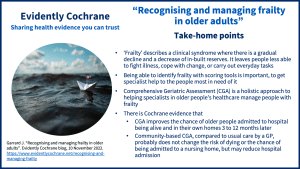In this blog for healthcare professionals wanting to know more about frailty and how best to care for older adults, Dr James Garrard, Registrar in Geriatric Medicine, looks at the importance of recognising frailty and the latest evidence on Comprehensive Geriatric Assessment.
Page last updated: 01 February 2023, with an Editor’s note about a recent Cochrane Special Collection (July 2022) which may be of interest to readers: Achieving sustainable healthcare through deprescribing of unnecessary medications: making sense of the evidence.
Take-home points
What do we mean by frailty?
In the UK, the number of people aged 85 and over is expected to double in the next 25 years. People are not only living longer, but increasingly living with multiple medical conditions and frailty. The word frailty is often mis-used and is associated with a lot of stigma, but it is a specific clinical syndrome. Frailty describes a syndrome where there is a gradual decline and decrease of in-built reserves, which leaves a person vulnerable to being unable to bounce back from a physical or mental illness, changes in medication or changes to environment. Increasing frailty affects the ability of a person to do everyday tasks, and increases the riskA way of expressing the chance of an event taking place, expressed as the number of events divided by the total number of observations or people. It can be stated as ‘the chance of falling were one in four’ (1/4 = 25%). This measure is good no matter the incidence of events i.e. common or infrequent. of them being admitted to a nursing home or dying. Whilst not all older people are frail, between a quarter and a half of people aged over 85 have frailty.
As well as the multiple effects of frailty on individuals, an ageing and increasingly frail populationThe group of people being studied. Populations may be defined by any characteristics e.g. where they live, age group, certain diseases. is expected to put a massive strain on already stretched health and social care services. Therefore, it is important to understand if there are different or better ways to deliver healthcare to older adults.
How best can we care for frail, older adults?
As a doctor who looks after frail, older adults, I think the importance of recognising frailty and managing frailty cannot be overstated. Identifying people with frailty and improving their care is understandably a priority for healthcare systems as well as being important for frail individuals and their families.
Frailty screening is done automatically by GP computer systems, and is now recommended for all older adults admitted to hospital. The NHS Long Term Plan recognises that supporting people to age well, identifying frailty, and focusing on out-of-hospital or ‘ambulatory’ care are all important steps in the changing the future of healthcare, to make it better for patients and staff alike.
The British Geriatric Society has produced guidance for any healthcare professional working with older adults, called Fit for Frailty. It focuses on improved recognition and management of frailty in community and outpatient settings, and is summarised with the following steps, which spells the word FRAIL.
F: Find.
R: Recognise frailty in a person.
A: Assess – a multidisciplinary assessment involving a geriatrician, allied health professionals, specialist nurses, and mental health and social work teams. The aim is to identify and manage long-term health conditions, identify goals and develop a personalised care and support plan.
I: Intervene – for example, a falls risk assessment and a multimorbidity review.
L: Long-term.
The main reason why identifying and recognising frailty is important, is to identify those who are most in need. Once frailty is recognised, you can then put in place interventions to try and prevent problems further down the line, or at the very least minimise the risk of harm as much as possible. This is where Comprehensive Geriatric Assessment becomes important in the care of older people.
What do we know about the effects of this approach?
There are four Cochrane ReviewsCochrane Reviews are systematic reviews. In systematic reviews we search for and summarize studies that answer a specific research question (e.g. is paracetamol effective and safe for treating back pain?). The studies are identified, assessed, and summarized by using a systematic and predefined approach. They inform recommendations for healthcare and research. which have brought together the best available evidence on the effects of Comprehensive Geriatric Assessment in different settings.
A Cochrane Review Comprehensive Geriatric Assessment for older adults admitted to hospital (published September 2017) showed that CGA led to more people being alive at 3-months, and fewer people were admitted to a nursing home at one-year. There was little or no difference in survival between 3-months and one-year. The cost of providing CGA was higher, but CGA was shown to be probably cost effective.
Similarly, a Cochrane Review Comprehensive Geriatric Assessment for older people admitted to a surgical service (published January 2018) looked at mostly patients admitted to hospital following a hip fracture. The review authors found that CGA probably improved the chance of survival and were more likely to return home.
In clinical practice, it is common to have dedicated in-patient wards for complex, frail older adults who are most likely to benefit from an expert multidisciplinary team. People over-65 who are admitted to hospital following a hip fracture, are looked after by a geriatrician-led multidisciplinary team after the initial surgery, to offer the best care possible. Read more about the evidence on helping people after a hip fracture in this blog – After hip fracture: how best to help people get back on their feet.
Providing healthcare out of hospital
As the demand on healthcare, especially for older adults, increases, this has led to a shift in focus to assess the safetyRefers to serious adverse effects, such as those that threaten life, require or prolong hospitalization, result in permanent disability, or cause birth defects. and cost-effectiveness of community-based, hospital level care.
A Cochrane Review Admission avoidance hospital at home (published September 2016) found that providing healthcare in an admission avoiding hospital at home setting probably makes little or no difference to patient health outcomesOutcomes are measures of health (for example quality of life, pain, blood sugar levels) that can be used to assess the effectiveness and safety of a treatment or other intervention (for example a drug, surgery, or exercise). In research, the outcomes considered most important are ‘primary outcomes’ and those considered less important are ‘secondary outcomes’., but may increase the chances of living at home at six months’ follow‐up, and may be slightly less expensive, which has also been demonstrated in a recent clinical study comparing CGA at home with hospital admission.
A recent Cochrane Review Comprehensive Geriatric Assessment for community-dwelling, high-risk, frail, older people (published May 2022) compared CGA performed in people’s homes or in the community with usual care in the community (such as their general practitioner). This review found there was probably no difference in the risk of dying at 12 months. While the chances of being admitted to a nursing home did not appear to change, low-quality evidence suggests CGA may reduce the chance of being admitted to hospital at around a year.
So, what does this mean for our frail patients?
Looking after frail, older people requires expertise in order to improve both the quantity and quality of life as much as possible. I am incredibly fortunate to be surrounded by experts from a range of backgrounds every day at work, and as a team we aim to help our patients make the best decisions for them. There is good evidence that CGA leads to not only improved survival of older people but helps them stay at home longer. The evidence for providing hospital-level care in community settings shows it appears not to be harmful, with low quality evidence to suggest some modest benefits. Importantly, NHS and British Geriatric Society guidance, and a key aspect of CGA, is that patients and their relatives are at the centre all decisions about their care. This should be the case, whether their care is provided in hospital, at home, or in a community clinic.
Information and resources about frailty
Here is a list of useful information for non-medical people, and healthcare professionals about frailty:
- Dr Patricia Cantley, a Geriatrician from Scotland, has written an excellent blog The Paper Boat explaining frailty using an analogy of a paper boat on the British Geriatric Society webpage (Twitter @Trisha_the_doc)
- The Clinical Frailty Scale which can be used as a Frailty screening tool in hospital:
- British Geriatric Society ‘Fit for Frailty’ guidance
- Age UK Charity patient-focused content on Understanding Frailty
- The NHS Long Term Plan
Editor’s note
A recent Cochrane Special Collection (July 2022) may be of interest to readers: Achieving sustainable healthcare through deprescribing of unnecessary medications: making sense of the evidence.
The collection provides an overview of Cochrane Reviews that have attempted to summarize the potential benefits and harms of deprescribing specific medications. Deprescribing involves discontinuing (or dose reducing) medications in which potential harms outweigh potential benefits.
The collection includes a Cochrane Review (updated January 2023) on medication review in hospitalised patients to reduce morbidity and mortality. The evidence suggests that “medication reviews [carried out by healthcare professionals in order to optimize an individual patient’s medication and improve health outcomes] in hospitalized adult patients likely reduce hospital readmissions and may reduce emergency department contacts, but may have little to no effect on the chance of dying”.
Join in the conversation on Twitter with @jamie_garr @CochraneUK or leave a comment on the blog.
Please note, we cannot give medical advice and do not publish comments that link to individual pages requesting donations or to commercial sites, or appear to endorse commercial products. We welcome diverse views and encourage discussion but we ask that comments are respectful and reserve the right to not publish any we consider offensive. Cochrane UK does not fact check – or endorse – readers’ comments, including any treatments mentioned.
James Garrard has nothing to disclose



